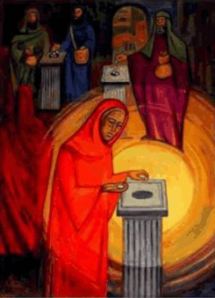The collect and readings for today can be found here. The appointed gospel is Mark 12:38-44.
Teaching in the temple, Jesus said, “Beware of the scribes, who like to walk around in long robes, and to be greeted with respect in the marketplaces, 39and to have the best seats in the synagogues and places of honor at banquets! 40They devour widows’ houses and for the sake of appearance say long prayers. They will receive the greater condemnation.”
41He sat down opposite the treasury, and watched the crowd putting money into the treasury. Many rich people put in large sums. 42A poor widow came and put in two small copper coins, which are worth a penny. 43Then he called his disciples and said to them, “Truly I tell you, this poor widow has put in more than all those who are contributing to the treasury. 44For all of them have contributed out of their abundance; but she out of her poverty has put in everything she had, all she had to live on.”
Today’s gospel reminds me of my 34th birthday. I sat down with Cyndy and our boys to open my cards and gifts. Our younger son, Randy, jumped up and said, “Wait, not yet!” He ran to his room. He came back a few minutes later. He was excited, bouncing off the walls. He was beside himself as he gave me his present. It was a sandwich baggie with one hundred pennies. He had taken a black magic marker and had written on the baggie, “$1.00.” He was thrilled with his gift to me and could not wait to give it to me.
He thought he was giving me $1.00. But the truth is he gave me everything he had. And I do not mean the contents of his piggy bank. That little baggie contained more than just pennies. He gave his love, presence, bounciness, excitement, joy, life. He gave me his very being. For what else does a four year old boy have to give? What else do any of us really have to give?
We all know this text as the “widow’s mite.” We’ve read the commentaries and heard the sermons – “The poor widow is an example of generosity. You should be generous like her.” I suspect most of us have heard that one or something similar more than once. Sometimes I think that we are so familiar with this story that we no longer hear or even look for another meaning. So we expect and settle for the usual interpretations. We are not surprised when this text is used for the annual stewardship campaign. Or we anticipate its use to criticize the rich for not giving more. And it holds before us the fact that there is an unequal and often unfair distribution of the world’s resources reminding us that the majority of the world lives without enough – without enough money, food, shelter, education, healthcare.
All of that is valid. There is truth in those interpretations. But there is also something else going on in this story. This gospel is not simply about the treasury of money. It is, rather, about the treasury of poverty. Hafiz, the great Sufi poet of the fourteenth century, offered this prayer:
God, grant me the riches of poverty for in such largesse lies my power and glory.
The riches of poverty. Most of us, I suspect, have not see or experienced the riches of poverty very often. Instead we tend to view poverty as a problem to be fixed and not as a source of power and glory. Poverty is often a problem to be eliminated and solved but not in today’s gospel. The poverty of the poor widow is not a problem to be fixed but rather a virtue to be interiorized. The poor widow becomes our teacher and we her students.
She embodies the virtue of spiritual poverty. She has no need for the money of the rich, the long robes of the scribes, or marketplace respect. She has no need for the best seat in the house or even the appearance of holiness. The absence of the widow’s need to have becomes her need not to have. So she does what makes no sense. She gives her last two coins. “She out of her poverty has put in everything she had, all she had to live on.” For what else does a poor widow have to give? She has no abundance, only the riches of poverty
The riches of poverty come not from acquiring but from letting go. All authentic spirituality is about letting go: letting go of comparison, competition, expectation, judgment; letting go of status, reputation, and appearances; letting go of the need for power, to control, to succeed, to win, to be right; letting go of our need for approval and perfectionism; letting go of all the illusions we create or buy in order to make ourselves feel better. Ultimately it means letting go of ourselves and the ones we love most.
Spiritual poverty begins with letting go and it always reveals the fragility of life. It takes us to the border between life and death where there are no guarantees – only hope, where there are no answers – only faith, and where there is no security – only love. This is where the poor widow lives. This is where God lives. And they live in union as one. In the face of the poor widow – the face of spiritual poverty – the Christ sees and recognizes himself.


Leave a comment